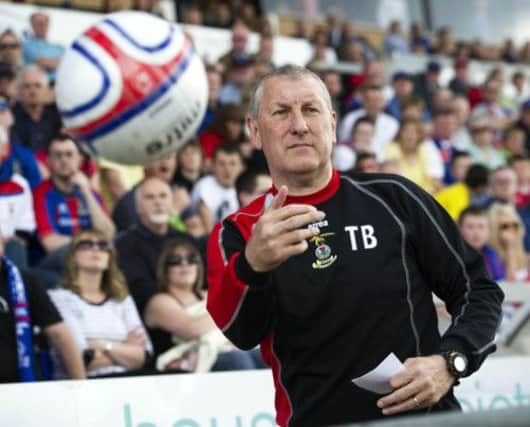Terry Butcher: Hibs move would be deserved reward


Pat Nevin, the Motherwell chief executive, had been briefing journalists at length throughout the process but the message that morning was delivered breathlessly and succinctly: “Just get yourself along to Fir Park later.”
Down the carpeted steps in the Motherwell media room came Eric Black, previously assistant manager to Jozef Venglos and then John Barnes at Celtic. Still as bright and energetic as he had been as an icon of Eighties Aberdeen, Black seemed a natural fit. But Nevin was not done with his stunt. There was another purr of recognition as Terry Butcher, the old warhorse who captained England and Rangers but who had not seemed cut out for management, stooped under the door frame to follow his new boss into the room.
Advertisement
Hide AdAdvertisement
Hide AdThe big man grinned throughout the rest of the evening, revived by his commission and the chance to learn how to do better the next time he was given his own team, an opportunity for which would only have to wait six months. He had been sacked twice in his early player/manager days, by Coventry City and by Sunderland, without having done disastrously badly, and when the Motherwell door opened he had not been directly employed in the game for eight years.
The same humility and gratitude would greet his appointment as assistant manager to George Burley with Scotland, another instance of the Englishman agreeing to step down to step up. At that time, in 2008, he had been sacked by Brentford after 23 games, precisely the same number of games he had overseen as manager of Sydney FC in Australia’s new A-League immediately beforehand. When the axe fell at Griffin Park it was the second time in 2007 he had lost his job.
Terry Butcher is a managerial survivor. Having done a marvellous job in Inverness, the mood in Leith suggests that his appointment would be met with applause there, which only serves to highlight football’s here-and-now rationale. At any other time, perhaps even when he was making a good fist of managing Motherwell, the patrons of Easter Road might have felt that they could do better.
Butcher has been burned by management enough times to disfigure his skin, but that skin has remained thick. Rather than sulk he has kept on coming back for more, remaining true to the values of hard work, honesty and humour that have won him respect and popularity, if not always won him football matches.
He has had a habit of turning up at unexpected times in unexpected places with an unassuming readiness to take on any challenge that interested him, regardless of how it might look on his CV. He has remained a humble, genial and reasonable person throughout a decade and more on the touchline, the period in a footballer’s life that usually turns them paranoid and irrational. If he takes the road with Hibs that now seems to be yawning in front of him it will be a well-earned ‘big break’, and one that many times in his journey he could not have imagined would come.
In the personality traits that he brings to the touchline – warmth, good humour, even occasional level-headedness – he bucks the trend. So will he buck the trend that has made the Hibs manager’s door revolve continuously for a decade? He certainly wouldn’t bring to the role the acid tongue of Bobby Williamson, the superficial sheen of John Collins or the enigmatic air of Pat Fenlon, who seemed to lose all warmth the moment he left the dressing room.
In that room, Fenlon must have been easy to like because Leigh Griffiths has felt moved to describe him as a “father figure”. But there is surely no manager in football more paternal than Butcher, who would be as quick to administer a bear hug on a player who needed one as a caustic rebuke.
Somehow that charm has been completely lost on a succession of chairmen, investors and supporters of football clubs that have not benefited from his extraordinary wealth of experience long enough to properly appraise his abilities as a manager. When Butcher left Motherwell for Sydney he did so with a dreamy outlook and, again, a huge sense of gratitude. He reported back about taking his family out for beachside dinners of white fish and white wine, and back home we were pleased for him. But big-spending Sydney, like Rangers or Celtic, wanted to win every game, and Butcher only won nine of his 23.
Advertisement
Hide AdAdvertisement
Hide AdThe pace of life might have given Butcher the wrong impression about the pace of the game in Australia at that time, and when the knives came out his barrel chest was an unmissable target. Butcher, of course, didn’t let the experience change him. Sydney were part-owned by the Hollywood actor Anthony LaPaglia, who mounted an indiscreet campaign to get rid of him. When asked about this, he replied: “Shareholders [are] people who feel passionate about the game, and they’re entitled to their opinion. Not that I’ll ever watch Without A Trace again.”
Wryness can be hard to detect over the internet, with the result that people all over the world perhaps thought this was a venomous counter-attack when in fact it was just big Terry Butcher’s way of shrugging off spite, of saying that football could do what it liked to him but he would never stop loving it.
His England career is most memorable for that picture of his bandaged head leaking blood, but few Scottish football fans rush to recall the fact that, with Gary Lineker scoring for fun, Butcher could have won a World Cup had he not been pickpocketed by the Hand of God. He has never forgiven Diego Maradona, but he has forgiven football for all manner of infidelities and injuries. With his thick skin he will be well-prepared for life at Hibs, and for life after it.